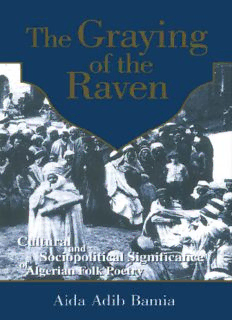
The Graying of the Raven : Cultural and Sociopolitical Significance of Algerian Folk Poetry PDF
Preview The Graying of the Raven : Cultural and Sociopolitical Significance of Algerian Folk Poetry
The Graying of the Raven This page intentionally left blank Winner of the AUC Middle East Studies Award 2000 The Graying of the Raven Cultural and Sociopolitical Significance 0 Algerian Folk Poetry Aida Adib Bamia The American University in Cairo Press Cairo New York Copyright © 2001 by The American University in Cairo Press 113 Sharia Kasr el Aini, Cairo, Egypt 420 Fifth Avenue, New York, NY 10018 www.aucpress.com All rights reserved. No part of this publication may be reproduced, stored in a retrieval system, or transmitted in any form or by any means, electronic, mechanical, photocopying, recording, or otherwise, without the prior written permission of the publisher. Dar el Kutub No. 7136/01 ISBN 977 424 667 5 Designed by Moody M. Youssef/AUC Press Design Center Printed in Egypt To the Algerian People This page intentionally left blank Contents Acknowledgments ix Note on Transliteration xi Introduction 1 Directions of This Study 6 A Source of History 6 Folk Poetry as Nostalgia 6 Map of Northern Algeria 9 1: The Power of Folk Poetry 11 Poetry as Messenger 12 Historical Overview 14 Folk Poetry as an Expression of National Identity 15 Folk Poetry as History 18 Folk Traditions and War 20 Folklore and French Colonialism 21 2: The History of the Malhun 23 Algerian Malhun: An Overview 23 Defining Malhun Poetry 23 Origins of the Malhun 25 Forms of Algerian Malhun 26 The Malhun: Memory of the People 27 The Good Fortune of Malhun Poetry 30 Fighting Oblivion 32 Poetic Folk Genres 34 Hawfi and Buqala: The Voices of Women 34 Ray: The Revival 34 Themes of Algerian Folk Poetry 34 The First Phase 35 viii —Content - The Second Phase 36 The Third Phase 39 The Setif Massacres: A Turning Point in Algeria's History 42 Colonized Mentalities 44 The Mturni 48 3: Muhammad bin al-Tayyib cAlili: A Man for All Seasons 49 The Man 49 An Atypical Peasant 52 The Poet's Period 53 4: cAlili's Repertoire 57 The Poet 59 The Poems of Strength 60 Al-Qadum: An Array of Rural Traditions. 60 Al-Rawz: The Image of the Present and a Vision of the Future 68 The Trials of Tulba and Marabouts 79 Al-Humma fi Bu Halwan: Setting the Stage 79 Arab Versus Berber 86 Bidun cUnwan: Ethnic Tensions 86 The Kabyle Myth 89 The Poems of Weakness 92 The Poet and French Colonialism 92 Bayet fi cAfrun: Seeking a Wall 92 Al-Wagfa: The Reversal 96 Conclusion 101 The Poems 103 The Hoe 105 Rice 110 Burning Fever in Bu Halwan 114 Untitled Poem 118 Sleeping in cAfrun 120 Drought 121 Notes 125 Bibliography 129 Index 137 Acknowledgments The completion of this book was possible thanks to the help of many people. I would like first to express my heartfelt thanks to Walda Metcalf, who kind- ly read the manuscript and made valuable suggestions, and insightful and challenging comments. My thanks to Salma Jayyusi for her advice on the rhythm and rhyme of Muhammad Bin al-Tayyib cAlili's poems. I am extremely grateful to my friend Josette Le Doeuff for her hospitality during my often lengthy visits to Paris and for graciously acting as a messenger between me and Mohammed Hadj-Sadok. I am deeply grateful to Anissa Masoudan for her help in gathering information on the buqala game and doc- umenting traditional Algerian costumes and jewelry. It is thanks to Yamina Kebir, a common friend of Mohammed Hadj- Sadok and myself, that I met Hadj-Sadok. It is to Mohammed Hadj-Sadok, however, that I owe my deepest gratitude, for sharing with me his large col- lection of unpublished folk poems, those of Bin al-Tayyib cAlili and others that await their turn to be published. I particularly thank him for his help in deciphering and transcribing the poems, and for providing me with back- ground information on the poet, his birthplace, and the persons with whom he interacted and whose names appear in some of the poems. In a special way he is the co-author of this book. My fervent thanks go to Mrs. Hadj- Sadok as well, who in her own way adopted this project and supported her husband's efforts. A grant from the American Philosophical Society (1993) made this research possible by providing me with financial support to spend one month in Paris to consult with Hadj-Sadok. A Humanities Enhancement Scholarship from the University of Florida allowed me to dedicate the summer of 1998 to writing the first draft of this work. I am grateful to my students at the universities of Constantine and Annaba, with whom I often traveled through eastern Algerian villages to collect folk texts. To all the Algerian families who opened their homes and their hearts to share their memories with me I would like to extend my sin- cerest thanks.
Description: